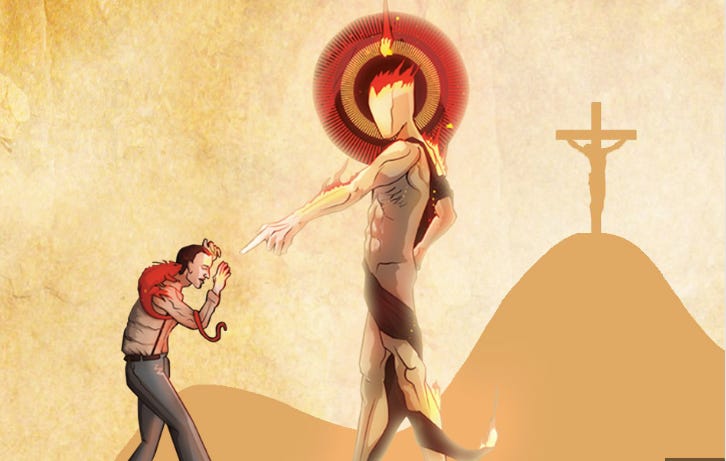I sit slouched, loosely browsing my book, my feet perched on my suitcase. I glance over my shoulder to check if my flight is still on time.
There’s a steady, chaotic stream of travelers flowing by. They limp, waddle, ride, run, and strut. As the ripples settle, I see a woman pacing down the walkway alone. She’s fuddling with her luggage as she walks. I hear a tap as a small object flutters and strikes the floor beneath her. Oblivious to this, she continues onward. I can’t tell what it is. It’s green and doesn’t look like much. Maybe a receipt or wrapper?
My curiosity wins the tug of the war. I leave my luggage and walk over to clarify it’s identity.
Credit card.
She’s about 100 feet away by now. I don’t think, I just move. I scoop up the card and jog after her, catching up to her a bit winded.
She’s beyond grateful when I stop her and return it.
As I return to my seat, I hear the approving voice of a woman seated nearby…
“Good job, I saw the whole thing”, she comments, as if she was going to report me to some board of virtue had I failed.
Another woman asks me to watch her bags, as I’ve demonstrated a glimmer of trustworthiness.
Before I pat myself on the back while gold star stickers rain all over me, I want to admit there have been numerous occasions where I’ve failed to act in scenarios analogous to the above. I simply stood still, dumbfounded in ambiguity.
Orientation
Sometimes I act, sometimes I don’t. Why?
To me this boils down to orientation. After all, “sin” translates in Hebrew to something like to miss the mark or target. This is far different from the crime punishable by the wrath of God that I once internalized.
The values you internalize, the goals you set out to achieve, your self-image, your world view, your aim—all of these qualities inform your perceptions, which create a relevant real-time image before you.
“Our eyes are liars. Everything that seems real, is merely part of the illusion. Nothing exists, as we think it does. Not you. Not me. Not this room. Nothing.” - Shantaram
Emotions are not mistakes. They manifest to motivate action or lack thereof as you proceed toward your aim. Joy, despair, depression, disgust, fear are all predictable in a given context.
4 ½ years ago I set out to become a software engineer. At one point in that journey I had no job, no income, no relationship, little social life, poor sleep, and a devastating back injury. Needless to say, I did not experience many positive emotions at that time. That’s the point. I felt terrible, but it motivated change.
Properly harnessed emotions function as a guiding compass. Should we numb, repress, or deny them, at best we’ll miss the value they present. At worst, they’ll run our lives outside our own conscious awareness.
But what is the ideal mark or target?
That’s up to you.
It’s ideal to be conscious of what you’ve chosen.
As enticing as they may be, false gods or targets, such as power and sex, if elevated to one’s stated or unstated primary target, lead to hell on Earth.
“And the higher and mightier it is in the natural order, the more demoniac it will be if it rebels. It’s not out of bad mice or bad fleas you make demons, but out of bad archangels” - C. S. Lewis
Slaying the Lizard
C.S. Lewis wrote beautifully about this concept in the Great Divorce1, where he depicts a bus ride from hell to heaven. The bus riders are ghosts, as they have yet to accept the full terms of heaven. They are tourists who’ve come to check it out.
As he wonders throughout the threshold of heaven, he witnesses dialogues between residents of heaven (spirits or angels) and ghosts.
Most can’t bear to stay because they try and bring portions of hell with them. They refuse to give them up, it’s their highest orientation whether they realize it or not.
In one of the most beautiful passages I’ve ever read, the battle over orientation plays out live. He encounters a ghost with a red lizard perched on his shoulder. The lizard represents lust, constantly whispering into the ghost’s ear. The ghost knows he cannot tolerate remaining in heaven with the lizard on his shoulder. He decides to return to hell.
Just as he sets off, a Spirit offers to quiet the lizard, but stipulates the only way to do so is to kill it. The ghost is torn, bargaining in every manner possible.
That’s too drastic
Let me go back to the bus and reflect first
How about we just silence it?
What if you kill me in the process?
Can we discuss this later?
Let me get an opinion from my doctor
As the ghost wavers, the angel insists killing the lizard is the only viable option. There’s no time to deliberate. But, critically, the ghost must give the angel permission to kill the lizard.
The lizard begins pleading…
You can’t live without me
Yes, I’ve taken things too far in the past but I’ll behave myself from now on
I promise to give you only sweet, innocent dreams
The ghost finally makes a decision. He decides it would be better to be dead than live with the lizard and gives the angel permission to kill it.
When the angel clutches his hands around the lizard, breaking it’s back and discarding it, the ghost begins to transform, taking the gradual shape of a man. This is reminiscent of King Theoden’s transformation in Tolkien’s (Lewis’ close friend) Lord of the Rings.
The lizard, twisted and broken in the brush, appears to be alive. It struggles, writhes and begins to grow. Soon it’s paws grow round and it’s tail, once scales now hair, flickers. Ultimately, the lizard transforms into “the greatest stallion I have ever seen”.
The ghost, now man, embraces the angel in tears then leaps onto the stallion’s back and rides off…
Space
“Between stimulus and response there is a space. In that space is our power to choose our response. In our response lies our growth and our freedom.” - Victor Frankl
Frankl’s quote is powerful. We have the freedom to choose our response, to pause in the space, stopping our predetermined reflex. This makes me think of Jung’s quote below.
“The greatest burden a child must bear is the un-lived life of the parent” - Carl Jung
Knowledge, pausing, reflection, accountability, mentorship, and responsibility all assist in ensuring our lives do not simply run on childhood conditioning autopilot.
That being said, there is a different type of intuitive wisdom one embodies as a result of internalized aim. There is no space. There is no time for thought, just action. This is thinking fast not slow2. Life does not always afford you time to think.
If you take too long to recognize it’s a credit card, the person who lost it is gone. These opportunities fill life with spontaneity, sudden impulses without premeditation. You’re tossing a ball in the air to see if someone wants to play. They don’t always want to, that’s not how the world works. But, often when you least expect it, a fun game ensues.
Ironically, 2 days after this incident I lost my wallet. A good samaritan found it and returned it.
+1 for faith in humanity.
Chronic Pain
4 years into my battle with chronic pain, my symptoms began to improve. I remember driving down Jamestown road in Williamsburg, Virginia the first time I noticed. My neck and upper back had been a deadened, nervy block of torment for a couple years. My mind was able to wander away from the attention seeking symptoms for a short period while driving. As the spotlight of my attention returned to my shoulders, neck and upper back, it felt better, as if someone had taken a highlighter with healing properties and brushed it along painful areas.
Mentally, as a 22 year old, I’d seen zero evidence that any of my symptoms would ever improve. They’d only gotten worse, that was the torture and suffering. I could not tangibly see a future that included optimism. This was the first glitch in the matrix, but amounted to an entire psychic change.
In reality, the change had occurred months prior, this was a downstream effect. I simply wanted to adopt a healthy lifestyle for it’s own sake. I internalized substantial change in my diet, sleep schedule, and movement practice.
I wasn’t following anyone else’s instructions or plan. I wasn’t “expecting results”. No 6 weeks until this or 8 weeks until that bullshit. No goals on a whiteboard.
This was how I wanted to live my life regardless of the effect it would have on my pain or symptoms. Over several months, these changes became a part of me. My values and orientation changed independent of my pain. Eventually my stagnant nervous system adapted.
Lewis, C. S. (1945). The great divorce. Geoffrey Bles.
Kahneman, D. (2011). Thinking, fast and slow. Farrar, Straus and Giroux.





